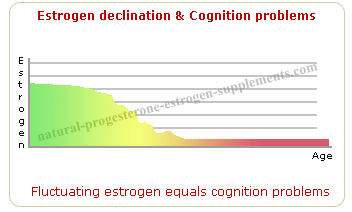34 MENOPAUSE SYMPTOMS |
HEALTH CENTER |
|
||||||||||||||||||||||||||||||||||||||||||||||
|
||||||||||||||||||||||||||||||||||||||||||||||
|
||||||||||||||||||||||||||||||||||||||||||||||
|
|
Estrogen and Its Effect on Cognition in Menopausal Women |
|
A recent study developed by a Yale research team had the objective to investigate the effects of estrogen on brain activation patterns in postmenopausal women as they performed verbal and nonverbal working memory tasks to confirm if estrogen levels really affect cognition. |
|
Postmenopausal women frequently complain about problems with attention, concentration and increased forgetfulness. These changes are usually linked with the declination of estrogen amounts in the body, as you can see in the chart on the right. Controlled studies of the cognitive effects of menopause and estrogen therapies, however, have been controversial. While estrogen replacement therapy shows promise in helping post-menopausal women preserve important cognitive abilities such as memory, its effectiveness is still being questioned because therapeutic doses of estrogen affect brain activity in postmenopausal women performing |
 |
|
memory tasks; however, estrogen did not affect verbal and nonverbal memory tasks.
Estrogen has very large and diverse effects on the central nervous system, and it also increases blood flow. For instance, former studies have shown that estrogen increases dendritic spines, structures that help nerve cells communicate in the hippocampus, a part of the brain involved in memory. That suggests the microstructure in the brain changes in response to estrogen. Estrogen also stimulates neurotransmitters such as serotonin and acetylcholine, which are important in memory. Sally Shaywitz, MD, of Yale University School of Medicine was the lead author of "Effect of Estrogen on Brain Activation Patterns in Postmenopausal Women during Working Memory Tasks". This study found altered neural circuitry in certain parts of the brains of postmenopausal women (aged 33 to 61 years) as they performed memory tasks. In a well-controlled experiment from 1996 through 1998, 46 women were tested when they were taking estrogen and when they were taking a placebo with no estrogen. The dose of estrogen was what is typically prescribed to postmenopausal women (1.25 mg of conjugated equine estrogens). To measure cognition activity, the researchers used a technology known as functional magnetic resonance imaging (fMRI), which produces computer-generated images of the brain during thinking, reading or remembering. Briefly, the technology measures the increase in blood flow that occurs in active areas of the brain. The researchers compared brain activation patterns in postmenopausal women when they were taking estrogen to when they were taking a placebo. They found that estrogen changed the brain activation patterns of the postmenopausal women and that the changes resembled brain activation patterns typically seen in younger compared to older people. The results of this study indicate that estrogen in a traditionally prescribed therapeutic dose produces significant alterations in brain activation patterns in specific brain regions in postmenopausal women as they perform working memory tasks. This study opens the door to future research of mental functioning in midlife people. "Brain circuitry can be changed. Midlife is apparently a time of great brain plasticity. The brain can rewire!" Dr. Shaywitz exclaimed. The evidence is mounting that estrogen therapy can improve the daily life of many women. However, taking estrogen after menopause has both benefits and risks, and considering it as a long-term therapy is a complex issue and must be made on a highly individual basis. By Natural-Progesterone-Estrogen-Supplements.com
Sources: Shaywitz S. E, et al. "Effect of estrogen on brain activation patterns in postmenopausal women during working memory tasks." JAMA, vol. 281, no13, pp. 1197-1202 (1999) |
| Back to Home: | 34 Menopause Symptoms |  |
